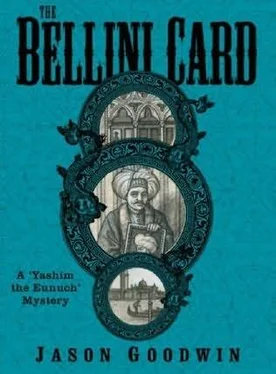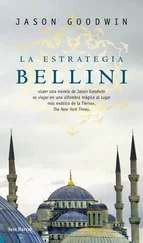Jason Goodwin - The Bellini card
Здесь есть возможность читать онлайн «Jason Goodwin - The Bellini card» весь текст электронной книги совершенно бесплатно (целиком полную версию без сокращений). В некоторых случаях можно слушать аудио, скачать через торрент в формате fb2 и присутствует краткое содержание. Жанр: Исторический детектив, на английском языке. Описание произведения, (предисловие) а так же отзывы посетителей доступны на портале библиотеки ЛибКат.
- Название:The Bellini card
- Автор:
- Жанр:
- Год:неизвестен
- ISBN:нет данных
- Рейтинг книги:5 / 5. Голосов: 1
-
Избранное:Добавить в избранное
- Отзывы:
-
Ваша оценка:
- 100
- 1
- 2
- 3
- 4
- 5
The Bellini card: краткое содержание, описание и аннотация
Предлагаем к чтению аннотацию, описание, краткое содержание или предисловие (зависит от того, что написал сам автор книги «The Bellini card»). Если вы не нашли необходимую информацию о книге — напишите в комментариях, мы постараемся отыскать её.
The Bellini card — читать онлайн бесплатно полную книгу (весь текст) целиком
Ниже представлен текст книги, разбитый по страницам. Система сохранения места последней прочитанной страницы, позволяет с удобством читать онлайн бесплатно книгу «The Bellini card», без необходимости каждый раз заново искать на чём Вы остановились. Поставьте закладку, и сможете в любой момент перейти на страницу, на которой закончили чтение.
Интервал:
Закладка:
his spectacles. “You would say, 1816.”
Yashim turned the pages. Each sura was brilliantly illuminated, according to a tradition that went back to the twelfth century, with stylized foliage crammed with animals and birds. There was no calligrapher’s signature; Yashim did not expect one.
The work itself was a signature; it bore the stamp of the man who had single-handedly worked to make this beautiful book. It must have taken months, if not years. The calligrapher was Metin Yamaluk.
The endpapers were very beautiful and carefully produced. Yashim paused over them, frowning. They showed a square, and between the corners and the midway point on each line of the square ran an endless knot, forming an eight-pointed star.
Palewski pointed to the diagram. “Seen that one before. It’s on the floor of the contessa’s salon, I think.”
“Is it?” Yashim murmured. He had seen it, too, weeks before in Yamaluk’s studio in Uskudar.
The Sand-Reckoner’s diagram.
Yamaluk’s Koran had been commissioned by Count d’Aspi. And Yamaluk himself had met the new sultan, to present him with an address.
“Printing!” Father Aristo sighed and gestured to the shelves. “I wonder, gentlemen, where Dante would have put the printers? Benefactors-or criminals?” He shook his head. “I hardly know.”
“I knew the man who made this Koran,” Yashim said.
They stood together in the candlelight, gazing down at the illuminated pages.
“Thank you, Father Aristo,” Yashim said. “You’ve shown me exactly what I needed to see.”
The old man nodded and rubbed his glasses with a fold of his soutane.
They left in the dark, with the old monk’s blessing.
The gondola was waiting at the gate. Palewski and Yashim climbed into the little cabin, where Yashim bent forward with a look of triumph.
“I’d like to meet your friend, the Contessa d’Aspi d’Istria,” he said.
Palewski shrugged. “Maybe.” He paused. “I tried to see her, too, twice. Three times. She wasn’t receiving visitors. Not after Barbieri was killed.”
Yashim was silent for a while. The water gurgled softly against the hull of the gondola.
“I think I know where we might find the painting, Palewski,” Yashim said. “If we’re not too late.”
81
Yashim sliced three onions, fine; they were red and crisp and he spread the rings onto a large white plate.
He took a big lamb’s liver and prepared it carefully, removing the arteries and the tough membrane. He sliced it into strips and tossed it in the flour and kirmizi biber.
In the frying pan he sauteed garlic and cumin seeds. The oil was hot; before the garlic could catch he dropped in the sliced liver and turned it quickly with a wooden spoon. The meat tightened and browned; he spooned the slices out and laid them on the onion rings. He chopped some dill and parsley and sprinkled them over the dish, and then, hungry, he took a piece of liver with an onion ring and popped them into his mouth.
Venetians would have cooked the onion until it was very soft. Delicious, in its way, and sweet, but lacking the boldness of the Ottoman original, Yashim thought, as the textures and flavors burst in his mouth. His arnavut cigeri looked better, too.
A shame that he had found no yogurt. He sliced a lemon and laid the wedges around the plate.
He drained the chickpeas. He would cook them with onion, rice, and the remainder of the signora’s delicious stock.
He made a marinade with the nigella seeds he had found at the e picier. They had been labeled black cumin, but Yashim knew better. He mixed them with lemon juice, crushed garlic, salt, pepper, and oregano. Into a bowl, weeping, he grated two onions. He mixed the pulp with a spoonful of salt.
He cleaned his knife and used it to slice three swordfish steaks into chunks, which he turned into the marinade. He took out a stack of vine leaves he had stripped, without much guilt, from a tendril blown over a high garden wall on his way home that morning. He washed them, softened them in the chickpea water in bunches of two or three, and dropped them into a bowl of cold water.
He squeezed the onion pulp between his hands and trickled the juice over the fish.
The signora used a long flat knife with a rounded end to smooth her polenta. Wondering if it were sacrilege he decided to use it as a skewer for the fish.
When he had wrapped each piece of fish in its vine-leaf coat, he found that the polenta knife was too blunt-ended to get through the leaves. Patiently he stuck each packet with Malakian’s little knife, widened the hole, and slipped it onto the broad blade.
He drizzled what was left of the marinade over the fish and set the skewer over the embers of the fire.
He prepared the rice. When it was covered with a cloth, and steaming gently, he went outside to the well and carefully washed his hands, his face, his ears, and nose.
“When you are ready, we can eat,” he announced.
82
Commissario Brunelli liked to think he’d seen everything in Venice, but when Maria brought him into her mother’s kitchen he changed his mind.
“My name, signora, is Brunelli. Vittorio Brunelli.” He took a deep sniff, and his chest rose. “I hope I am not disturbing you.”
The candlelight, at first, made the hairs prickle at the nape of his neck. He felt it all-the light, the smells, the shadows on the faces-long before he realized what it was.
It was a feast among the poor.
He saw the turban. He saw Palewski’s lean, pale face. He saw Maria, doubtful, with her jet-black hair. He saw children, shaved headed, staring at him with their big eyes, and their father, smiling, and the shadows and the black beams and the embers of the dying fire.
He advanced, unsteadily, into the room.
“Buon appetito,” he said with a bow, and stumbled into a pallet on which he was scarcely surprised to see the figure of the dying Christ.
“Please, Signor Brunelli,” the signora said magisterially. “Join us.”
Brunelli found himself squashed onto the end of a bench with a small child on one side and Yashim on the other, and knife, fork, plate, and red wine in front of him.
The only difference between this and other feasts he could imagine was that no one seemed actually to be eating.
His nostrils twitched, and his gaze returned to the table. It was covered with a clean cloth, and on it stood several plates. He saw a mound of rice, a dish of something with raw onion, a heap of curious green packages about the size of eggs, and an earthenware dish containing something in a white sauce.
Around the table he noticed a lot of very suspicious faces.
The Brunelli name was not inscribed in the Golden Book, which had listed the aristocratic families entitled to enjoy the burdens and the rewards of government. But the blood of Venice flowed in Brunelli’s veins nonetheless, the blood of men who had eaten raw horsemeat with the riders of the Crimea, nibbled thousand-year-old eggs with the Great Khan in Cathay and spice-laden stews with the Bedouin of the Persian gulf-not to mention boiled cabbage in the halls of the Polish kings.
Brunelli stretched out his hands, inspired, and delivered a grace. It was a grace he had heard said in the Ghetto, many times.
“Blessed are you, our God, Lord of the Universe, who brings forth bread from the earth.”
Palewski smiled and helped the signora to the pilaff.
Brunelli picked up the vine leaves and offered them to his neighbor. Yashim took one, Brunelli another. They passed the dish along. A small child helped himself to some pilaff. Maria’s father took a spoonful of liver and onions, while Maria picked up a vine-leaf parcel and bit into it. She gave a little cry of appreciation.
Читать дальшеИнтервал:
Закладка:
Похожие книги на «The Bellini card»
Представляем Вашему вниманию похожие книги на «The Bellini card» списком для выбора. Мы отобрали схожую по названию и смыслу литературу в надежде предоставить читателям больше вариантов отыскать новые, интересные, ещё непрочитанные произведения.
Обсуждение, отзывы о книге «The Bellini card» и просто собственные мнения читателей. Оставьте ваши комментарии, напишите, что Вы думаете о произведении, его смысле или главных героях. Укажите что конкретно понравилось, а что нет, и почему Вы так считаете.












